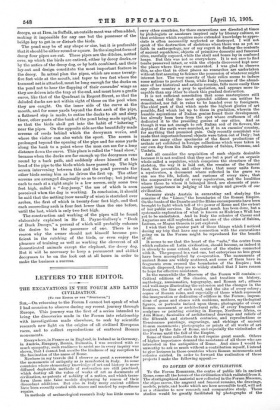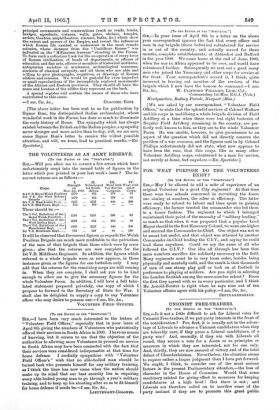LETTERS TO THE EDITOR.
THE EXCAVATIONS IN THE FORUM AND LATIN CIVILISATION.
[To THE EDITOR Or TER "SPECTATOR."]
Sit,—On returning to the Forum I cannot but speak of what I had occasion to observe during my recent journey through Europe. This journey was the first of a series intended to bring the discoveries made in the Forum into relationship with investigations made elsewhere, to seek by scientific research new light on the origins of all civilised European races, and to collect reproductions of scattered Roman monuments.
Everywhere, in France as in England, in Ireland as in Germany, in Austria, Hungary, Bosnia, Dalmatia, I was received with so much sympathy, such readiness to assist me in every inquiry was shown, that I cannot but ascribe the kindness of my reception to the fascination of the name of Rome.
• Nowhere in my travels did I observe as great a reverence for the monuments of antiquity as is manifested in Italy. In some countries where elementary knowledge of art and history is more diffused deplorable methods of restoration are still practised, which destroy all the value of works of art as documents of civilisation, as patents of nobility of a nation, and which trans- form them into, false models displeasing by reason of their discordant additions. But also in Italy many ancient edifices have been recently coated with stucco and masked by superfluous repairs. In methods of archaeological research Italy has little cause to envy other countries, for there excavations are directed at times by philologists or amateurs inspired only by literary culture, so
that evidence which requires more extended knowledge to appre- ciate is often necessarily neglected or destroyed. I will not speak of the destruction of skeletons when there was as yet no faith in anthropology, nor of my regret in finding the contents of ancient sepulchres, objects of primitive domestic and funereal rites, carefully exposed, while the skull and bones lay in confused heaps. But this was not so everywhere. It is not rare to find tombs preserved intact, or with the objects discovered kept near the places where they were excavated. I was glad to observe this, as also that in other places no researches are undertaken without first assuring to Science the possession of whatever.might interest her. The very scarcity of their relics seems to induce some nations to protect them, while Italy, because of the abund- ance of her historical and artistic remains, falls more easily than any other country a prey to spoliation, and appears more in- capable than any other to check this gradual destruction.
It is not sufficient consolation that some masterpieces still remain, and that the most splendid edifices can neither bo demolished, nor fall in ruins to be banded over to foreigners.
The chief part of that which made the highest glories of art possible, And which led up to them in gradation, wherein the humble aspirations of Italian genius found their development, has already been torn from the spot where craftsmen of old dedicated it to the presiding genius of our cities. And as though it was not enough to rob Italian soil of its flowers, the depths of the earth were searched, as if in an enemies' country, for anything that promised gain. Only recently complaint was made that important funeral objects were taken out of Italy; but there are many other specimens of the finest productions of archaic art exhibited in foreign collections which were taken in our own day from the Italic sepulchres of Sabina, Picenum, and Umbria.
And all consider the acquisition of such objects desirable because it is not realised that they are but a part of an organic whole called a sepulchre, which comprises the structure of the skeleton, the way it is laid out, the remains of the funeral feast, the parentalia, and other rites ; that many units form
a sepulcretum' a document where reflected in the grave wo
can see the life, beliefs, and customs of every race ; that the comparative study of every sepacretum, and the localities where those to whom it belonged lived, are elements of para- mount importance in judging of the origin and growth of our civilisation.
Germany rivals Austria in excavating and studying the remains of the " Limes," the boundaries of the Roman Empire.
On the banks of the Danube and the Rhine encampments have been brought to light which tell of the power of Rome and the extent of her public services. In England much has been done, but a systematic exploration of what is known as Hadrian s Wall has yet to be undertaken. And in Italy the colonies of Caesar and Augustus are still neglected, and not one of the cities of Sabina, Latium, or Magna Graecia is yet explored.
I wish that the greater part of those things which I noticed during my trip that have any connection with the excavations going on in the Forum might be reproduced for the benefit of all.
It seems to me that the heart of the "urbs," the centre from which radiates all Latin civilisation, should become, as indeed it is already to some extent, the centre of the studies connected with it. The proposal is a vast one, but enterprises no less great have been accomplished by co-operation. The monuments of ancient Rome are widely scattered, and some of them have in fragments even crossed the boundaries of the Empire ; but though dispersed, they are so widely studied that I have reason to hope for effective assistance.
In the meanwhile the Museum of the Forum will contain :— Critical editions of the classics, and treatises on history, mythology, numismatics, topography, and Roman art ; atlases and wall-maps illustrating the extension and the changes in the frontiers, the line of each road, and the site of every colony ; copies of Roman coins, and especially of those which represent the inauguration or dedication of edifices in the Forum ; impres- sions of gems and stones with emblems, mottoes, mythological figures, or portraits incised upon them ; photographs of every
Roman monument or architectural relic, of every fragment of sculpture or painting existing in Europe, Northern Africa, or
Asia Minor; facsimiles of architectural drawings and reliefs of the fifteenth and sixteenth centuries, and reproductions or Renaissance paintings, engravings, and etchings of ancient Roman monuments; photographs or prints of all works of art inspired by the fate of Rome, and especially the vicissitudes of the Forum until the fall of the Empire.
Some of these collections do not require great search. Others of higher importance demand the assistance of all those who are interested in the antiquities of Rome. And since I would be unworthy to ask so much without a contribution myself, I intend to give lectures in those countries where Roman monuments and colonies existed. In order to forward the realisation of these projects I make the following appeal :— TO LOVERS OF ROMAN CIVILISATION.
To the Forum Romanum, the centre of public life in ancient Rome, come all the lovers of the civilisation which radiated from it. The stratigraphical material now collected in the Forum Museum, the stipes sacrae, the augural and funeral remains, the drawings, models, prints, and books which are here accessible to all, will act as a stimulus to new research and comparative study. These studies would be greatly facilitated by photographs of the principal monuments and constructions (such as roads, tombs, bridges, aqueducts, cisterns, walls, gates, shrines, temples, arches, theatres, amphitheatres, circuses, baths, &c.) which show the extent and powers of the Empire, and reveal the influences which Roman life exerted or underwent in the most remote colonies, whose distance from the "Umbilicus Romae " was indicated on the " Milliarium Aureum" standing in the Forum. To form such a collection I ask for the co-operation of every lover of Roman civilisation, of heads of departments, or officers of education and fine arts, officers or members of historical institutes, antiquarian societies or academies, archaeological museums, students of classical antiquity, and all those who are able and willing to give photographs, negatives, or drawings of Roman edifices and remains. We would be grateful for even imperfect or small reproductions of the incompletely explored monuments of the African and Eastern provinces. They should all have the name and location of the edifice they represent on the back.
A special register will contain the names of those who have contributed to this cause.
[The above letter has been sent to us for publication by Signor Boni, the distinguished Italian archaeologist, whose wonderful work in the Forum has done so much to illuminate the early history of Rome. The sympathy which has always existed between the British and the Italian peoples, a sympathy never stronger and more active than to-day, will, we are sure, cause Signor Boni's letter to receive the widest possible attention, and will, we trust, lead to practical results.—En. Spectator.]











































 Previous page
Previous page